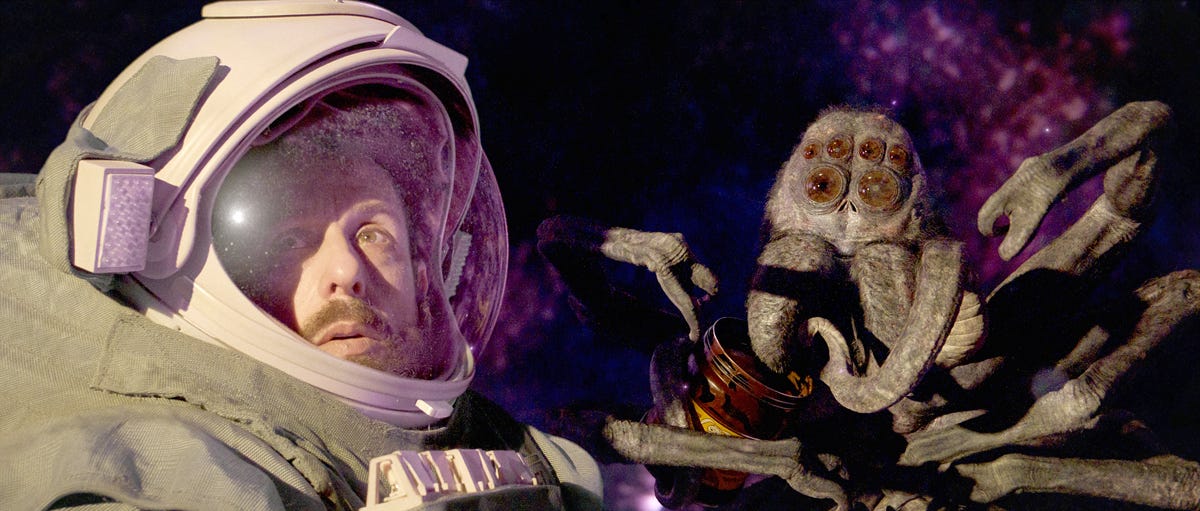Adam Sandler and a Giant Spider Make Beautiful Music in 'Spaceman'
Netflix adds an odd and glorious twist to the Sad Astronaut Movie canon.
Welcome to The #Content Report, a newsletter by Vince Mancini. I’ve been writing about movies, culture, and food since the aughts. Now I’m delivering it straight to you, with none of the autoplay videos, takeover ads, or chumboxes of the ad-ruined internet. Support my work and help me bring back the cool internet by subscribing, sharing, commenting, and keeping it real.
—
What is it about going to space that makes us turn inwards? Every time a movie star ventures into the cosmos, it seems that what he (or she!) really discovers is love for a spouse or closure over a dead child (so often with the dead child). Matthew McConaughey crosses the event horizon and travels through a black hole in Interstellar, only to end up typing Morse code love notes from inside his daughter’s bookcase. Isn’t that just the way?
I don’t say this as a gripe or a criticism, it makes perfect sense. It’s scary out there in space. The further you venture into the abyss, the more you ponder infinite nothingness and the circular nature of time, the more you end up just wanting to hug your husband or your daughter or your dog. To be entirely disconnected is to understand the value of connection.
These are the basic themes of Adam Sandler’s new Netflix movie, Spaceman, and also the basic themes of similar Sad Astronaut movies Interstellar, Gravity, Arrival, First Man, Midnight Sky, Ad Astra, et al. If that makes Spaceman sound derivative, it’s not (and honestly, give me all of the sad astronaut movies). If not the most expensive or spectacular or special FX-heavy of its peers, Spaceman might be the most inventive, a winning combination of charmingly odd choices in service of universal yearnings. It stars Adam Sandler as a depressed astronaut who discusses his failing marriage with a giant spider and the big joke is that it’s not really a comedy (though it is often quite funny). I loved it.
One lesson screenwriters could learn from Spaceman is that the way to make a story feel universal is to fill it with the specific. Adam Sandler plays Jakub Procházka, a Czech cosmonaut sent beyond Jupiter to investigate the Chopra cloud, an interstellar event that has created a purple stain in the sky that no one can explain. Why it happens that it’s the Czech Republic who have sent the spacecraft and not the more familiar space powers — the US, Russia, China — is never explained, though the film does reference a mission from South Korea that’s a few days behind Jakub’s. Possibly a riff on the death of NASA and the privatization of space travel? We’re left guessing as to whether this story exists in our timeline, takes place in the future, or in some alternate reality where the Czech Republic is the leading space power.
The rub is that it’s a specific choice to make Sandler a Czech, which leads to all sorts of other story decisions, and by not justifying everything with expository dialogue, the film gives us space to dream. You don’t necessarily have to understand why a writer made every decision, just as long as it feels like they had a reason. (“Whatever you do, just make it seem like you did it on purpose,” as Bill Murray’s character says in The French Dispatch, the most poignant and succinct guide to the creative process as exists).




